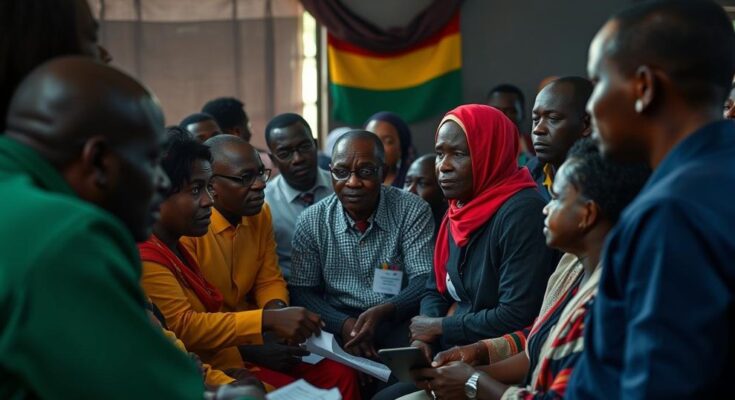Following the recent elections in Mozambique, accusations of widespread electoral fraud have emerged, primarily from opposition candidate Venancio Mondlane. The incumbent ruling party, FRELIMO, appears poised for victory, with preliminary results indicating that Daniel Chapo has garnered around 53.68% of the vote. However, Mondlane contests these results, claiming significant electoral malpractice, which may threaten Renamo’s position as the primary opposition force. Irregularities, including alleged illegal voting by non-Mozambicans in Zimbabwe, exacerbate concerns about the legitimacy of the electoral process.
The political landscape in Mozambique has been shaken as allegations of widespread electoral fraud have surfaced following the recent elections. The ruling party, the Liberation Front of Mozambique (FRELIMO), which has maintained power since the country’s independence nearly five decades ago, appears to be on the verge of another victory. Daniel Chapo, the FRELIMO candidate, allegedly secured approximately 53.68% of the votes in the capital, Maputo, while opposition candidate Venancio Mondlane claimed to have garnered 33.84%. Despite FRELIMO’s apparent success based on official figures, Mondlane has vehemently declared victory, asserting that he is a victim of substantial electoral malfeasance. “What we are seeing here is election rigging of the highest order,” Mondlane stated, indicating that this pattern of fraud has persisted over previous elections. In Cabo Delgado, a region afflicted by a long-standing jihadist conflict, FRELIMO similarly reported a resounding victory, where it claimed around 66% of the votes. Analysts have noted a concerning trend for the main opposition party, Renamo, which may be displaced by Podemos as the leading opposition force. Jaime Guiliche, a notable political analyst, suggested the consequences of Mondlane’s departure from Renamo could potentially diminish Renamo to third place in Mozambique’s political hierarchy. In response to the alleged electoral infractions, Renamo has called for the invalidation of vote counts in several districts where they contend their representatives faced barriers to proper oversight. Manuel de Araujo, Renamo’s gubernatorial candidate in Zambezia, has embarked on a campaign in Europe and America to highlight what he perceives as electoral misconduct in Mozambique. He noted, “There was organized disorganization by the electoral authorities, who did not provide enough staff or the necessary voting materials in many polling stations.” Significant issues have been reported in the voting process, particularly in neighborhoods traditionally aligned with Renamo where names were allegedly removed from voter rolls. Compounding these claims, Araujo described an incident in Quelimane where pre-filled ballots favoring FRELIMO were discovered, raising questions about the legitimacy of the electoral process. Irregularities have also been documented among the Mozambican diaspora, particularly in Zimbabwe, where reports surfaced of non-Mozambican citizens voting illegally in the elections. It has been alleged that these voters were encouraged by the Zanu-PF party, which has historical ties to FRELIMO, to support Chapo’s candidacy. This development could have significant implications for Mozambique’s political integrity and stability. The unfolding events suggest a complex interplay of political maneuvering, allegations of corrupt practices, and a potential shift in Mozambique’s political alliances, demonstrating the fragile nature of its democratic process.
In Mozambique, the recent elections have highlighted ongoing tensions and fraught relations between the ruling party FRELIMO and opposition forces, chiefly Renamo. Since gaining independence in 1975, FRELIMO has entrenched itself as the dominant political entity; however, the emergence of new parties and shifting allegiances, such as Venancio Mondlane’s defection from Renamo to run as an independent, raises questions about the future electoral dynamics. Allegations of fraud have marred previous elections and continue to cast a shadow over the current electoral legitimacy, especially amid rising frustrations from opposition parties and civil society regarding electoral processes and fairness in governance. The inclusion of foreign nationals voting in domestic elections further complicates an already delicate situation, risking further destabilization of the political environment in Mozambique.
The allegations of electoral fraud in Mozambique have reset the political conversation as FRELIMO prepares for what appears to be another electoral victory amid serious charges of misconduct. Venancio Mondlane’s claims of fraud, particularly related to the disenfranchisement of voters and improper ballot handling, reflect ongoing challenges faced by opposition parties. The potential shift in political power dynamics, with the rise of Podemos and the erosion of Renamo’s stronghold, signals that the political landscape in Mozambique may be undergoing significant transformation, amplifying concerns around the integrity of democratic processes in the region.
Original Source: www.dw.com




